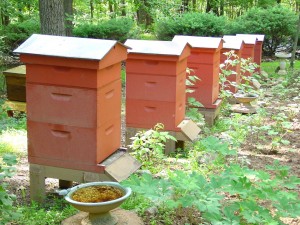8/2 The Way I’d Like to Bee
Image courtesy of blog.bougiecandle.com
This weekend we were at a birthday party with scads of people we did not know. The vegan thing came up and there were a few questions. One of them was why won’t you eat honey? More than other aspects of veganism, I have found that so many are perplexed by this choice to not consume honey. When I first began to adopt a vegan lifestyle, I wasn’t sure what I believed so I stopped consuming honey until I was ready to form my own opinion. I have thought about it, researched it and ultimately decided to stick with my original decision to not consume honey or products that contain honey.
For me, the bottom line is that honey was not created for me to consume, it was created for them (the bees) to consume. Bees work during the warmer months collecting nectar and turning it into honey to store to nourish themselves throughout the colder months when flowering plants may not be available. It is a natural part of their survival and life cycle. If we interrupt that or falsely create that cycle in a created colony, then how will they survive?
I found this question being posed and answered very eloquently on www.buzzaboutbees.net and it made great sense to me.
Is it alright for humans to steal the honey, then?
Assuming there is plenty of food available to them from plant and tree blossoms, and assuming the weather is okay for the honey bees to venture out, then hopefully there is plenty of honey so that it’s alright for humans to take some of it. Remember that in the wild, predation is natural. Other insects, mammals and even birds (often with the help of another predator) will steal some of the honey from honey bee nests.
However, I feel the real skill of the beekeeper is in knowing how much the bees need, and how much can be taken. Many Natural Beekeepers will only take a modest amount of honey during the summer, then take some of or all of whatever is left once they are sure the winter has passed, and there is now available nectar again for the bees. Some of these beekeepers also ensure they keep plenty of the bees’ own honey in store during the winter, in case the bees need it. (Note, it is important that honey bees are only fed their own honey, to ensure viruses and disease do not spread between bees).
However, some beekeepers remove all the honey from bees, and only provide sugar in return. Sugar is in no way as nutritious for the bees as honey is. I see no reason why we should (perhaps conveniently) assume that honey is good for humans, but unimportant for bees! Personally , I think humans need good diets for immunity, health, and strength, and so why not bees?
Image courtesy of masternewmedia.org
Thank you to BuzzAboutBees for that insight.
So here we are, at the “reason”. If a bee keeper houses colonies of bees gathering their honey for sale or his own consumption, it feels wrong to me. In most of the products commercially available that contain honey it is impossible to know where that honey came from. Therefore, we couldn’t know whether or not it was collected using honorable methods and practices. It feels like we are interjecting ourselves into a vital part of our own ecosystem where we don’t belong. Many crops including cucumbers, eggplant and squash are pollinated by bees. We expect bees to assist us in nourishing ourselves but take their food in return. Now that I understand why bees make honey and how they make their honey, it feels like a simple choice. There are many convenient, inexpensive and delicious sweeteners that are as luxurious and available as honey. That feels like the sweetest choice of all.
Click here for a very short and funny clip called “Humans Stealing Honey” from the animated Bee Movie. It kind of sums it all up.
What do you think? I would love to hear from you.
Have a delicious day.
Tags: compassionate eating, dairy free, do vegans eat honey, going veg, honey and veganism, plant based diet, trying vegan, trying vegetarian, vegan, vegan challenge, vegan experience, vegan transition, vegan wannabe, vegetarian transition



August 2nd, 2011 at 9:18 am
As I’m sure you know, I respectfully disagree. :). Bees are the most skilled herbalists out there. My personal belief is that honey and pollen are often the most effective medicines available, and they happen to be quite compatible with human digestion and nutrient assimilation. Most passionate beekeepers are as interests in keeping the bees happy and healthy and fed as they are about collecting honey. With responsible beekeeping, bees are not enslaved by humans, instead they are protected and a symbiotic relationship is formed. The honey issue is the main reason I do not call myself vegan.
August 7th, 2011 at 10:02 pm
Jennifer,
Thank you for sharing. I appreciate your input and the opportunity to further the dialogue about consuming honey. The better informed we become, the easier it is to make good decisions about the products we use.